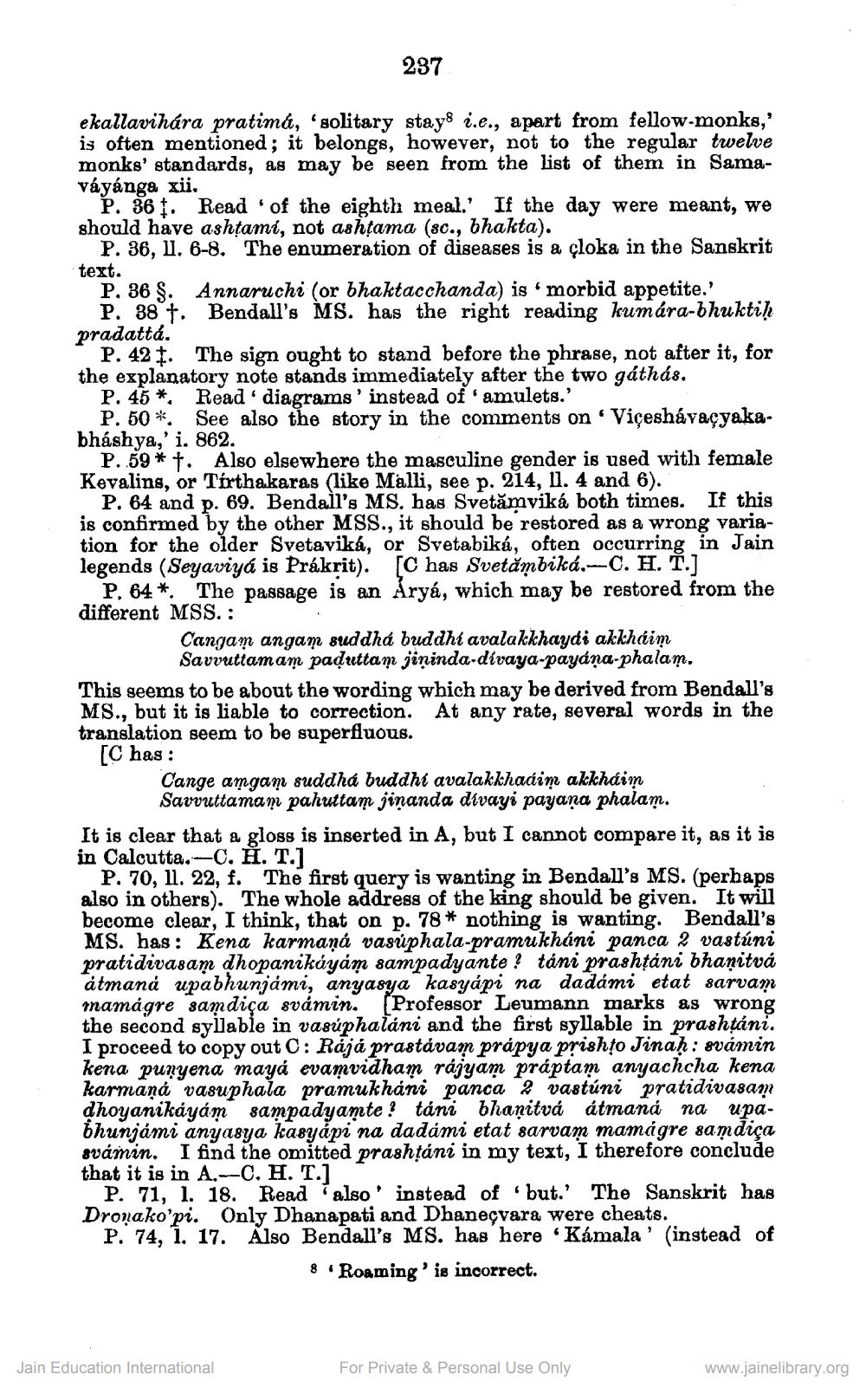________________
237
ekallavihára pratima, solitary stay8 i.e., apart from fellow-monks,' is often mentioned; it belongs, however, not to the regular twelve monks' standards, as may be seen from the list of them in Samavágánga xii.
P. 361. Read of the eighth meal.' If the day were meant, we should have ashtami, not ashtama (80., bhakta).
P. 36, II. 6-8. The enumeration of diseases is a cloka in the Sanskrit text.
P. 36 $. Annaruchi (or bhaktacchanda) is morbid appetite.'
P. 38 +. Bendall's MS. has the right reading kumára-bhuktih pradattá.
P. 42. The sign ought to stand before the phrase, not after it, for the explanatory note stands immediately after the two gáthás.
P. 45*, Read diagrams' instead of amulets.'
P. 50 * See also the story in the comments on Viçeshávaçyakabháshya,' i. 862.
P..59* t. Also elsewhere the masculine gender is used with female Kevalins, or Tirthakaras (like Malli, see p. 214, 11. 4 and 6).
P. 64 and p. 69. Bendall's MS. has Svetămviká both times. If this is confirmed by the other MSS., it should be restored as a wrong variation for the older Svetaviká, or Svetabiká, often occurring in Jain legends (Seyaviyá is Prákrit). [C has Svetămbiká.-C. H. T.]
P. 64*. The passage is an Arya, which may be restored from the different MSS.:
Cangan angam suddhá buddhi avalakkhaydi akkhdim
Savvuttamam paduttam jininda-divaya-payána-phalam. This seems to be about the wording which may be derived from Bendall's MS., but it is liable to correction. At any rate, several words in the translation seem to be superfluous. [C has :
Cange amgam suddha buddhi avalakkhadim akkhdim
Savvuttamam pahuttam jinanda divayi payana phalam. It is clear that a gloss is inserted in A, but I cannot compare it, as it is in Calcutta.-C. H. T.1
P. 70, 11. 22, f. The first query is wanting in Bendall's MS. (perhaps also in others). The whole address of the king should be given. It will become clear, I think, that on p. 78* nothing is wanting. Bendall's MS. has : Kena karmaná vasúphala-pramukháni panca 2 vastúni pratidivasam dhopanikáyám sampadyante ? tani prashtani bhanitvá åtmaná upabhunjámi, anyasya kasyápi na dadámi etat sarvam mamagre samdica svámin. (Professor Leumann marks as wrong the second syllable in vasúphalani and the first syllable in prashtáni. I proceed to copy out C: Rájá prastávam prápya prishto Jinah: svámin kena punyena mayá evamvidham rájyam práptam anyachcha kena karmaņa vasuphala pramukhani panca 2 vastúni pratidivasam dhoyanikáyám sampady amte? tani bhanitva átmana na upabhunjámi anyasya kasyápi na dadami etat sarvam mamágre samdica svamin. I find the omitted prashtáni in my text, I therefore conclude that it is in A.-C. H. T.]
P. 71, 1. 18. Read also instead of but.' The Sanskrit has Dronako'pi. Only Dhanapati and Dhaneçvara were cheats.
P. 74, 1. 17. Also Bendall's MS. has here Kámala' (instead of
8
Roaming' is incorrect.
Jain Education International
For Private & Personal Use Only
www.jainelibrary.org




